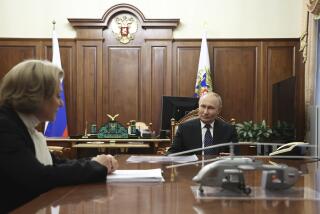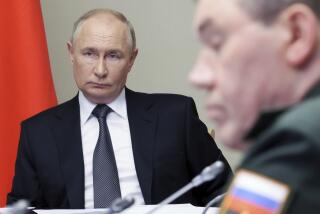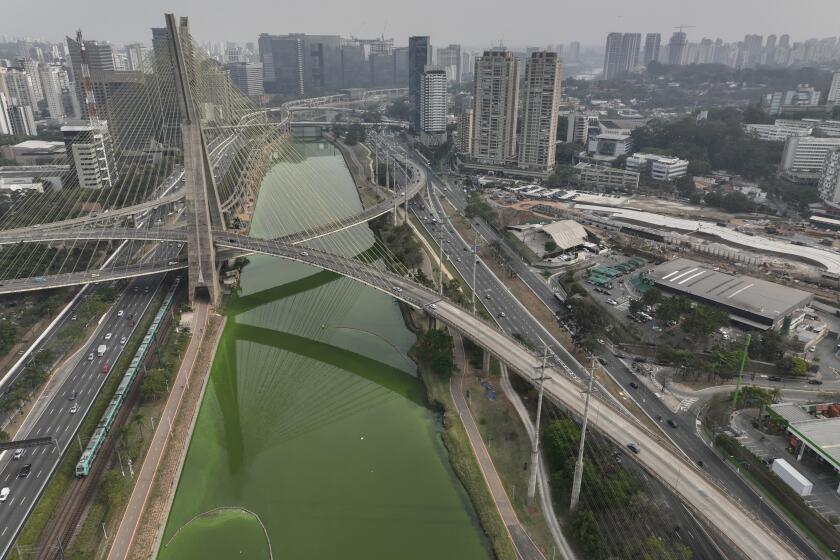Moscow Calls Reserves to Help Halt Civil Strife : Soviet Union: The defense minister calls the situation in Armenia and Azerbaijan ‘a major disaster.’
MOSCOW — The Soviet government, struggling to re-establish its authority in the southern republics of Armenia and Azerbaijan, on Thursday put its armed forces there on a wartime footing and mobilized reservists as the fighting between Armenian and Azerbaijani militias grew.
Gen. Dmitri T. Yazov, the defense minister, described the situation in the area as “a major disaster” and said more troops are needed to enforce the state of emergency declared there Monday by the Soviet leadership in an attempt to restore order. And President Mikhail S. Gorbachev, in his first public comments on the crisis, defended the government’s decision to send combat troops to quell the violence.
Despite the deployment of thousands of additional troops over the past two days and orders that they should open fire if attacked, “over the past 24 hours, the situation in Azerbaijan and Armenia has worsened,” the official Tass news agency reported late Thursday.
Fighting was reported in districts around the disputed region of Nagorno-Karabakh, along parts of the Armenian-Azerbaijani border and just 20 miles south of Yerevan, the Armenian capital, where Azerbaijani militia units were said to have opened fire on two villages, killing a total of six people.
“Leaders of the Azerbaijani Popular Front are ignoring appeals by the leadership of the republic and of the nation to stop illegal actions and to find a way out of the conflict,” the Tass report said.
“In Armenia, the seizure of arms and military equipment continues. Groups of armed militants are being formed in both republics. Extremists from the two conflicting sides seize civilian and military hostages.”
The two militias, which have raided police stations and ordnance depots, are now armed not only with rifles, machine guns and rocket launchers but also armored vehicles, helicopters and short-range missiles in what Interior Minister Vadim V. Bakatin flatly called a “civil war.”
The Interior Ministry put the death toll at 66 after seven days of violence, but this figure is believed to be mostly those killed in anti-Armenian rioting in Baku, the Azerbaijani capital. The actual number, which includes several soldiers in the peacekeeping force, is thought to be much higher.
The ministry said 220 people have been wounded, again mostly in Baku.
So widespread were the clashes, some of them quite large, that the Soviet government Thursday no longer was facing only civil unrest but also a significant challenge to its authority.
Besides remarking on the use of force, Gorbachev, speaking to a Kremlin meeting Thursday, offered a justification for the government’s decision Monday to declare a state of emergency in the region.
“The problems, which have been accumulating for tens--no, for hundreds--of years, have erupted and acquired the character that we are now confronted with,” he said. “We are now busy trying to halt this process, to prevent it from going deeper and becoming more acute. We have resorted to the use of force against criminals, against this vandalism.”
The enmity between Armenians and Azerbaijanis is rooted deeply in history and in sharp cultural and religious differences between them. One of the world’s oldest civilizations, the Armenians are largely Christian and feel themselves an endangered nation after repeated massacres of their people. The Azerbaijanis, a Turkic-speaking nation, most of whom are Shiite Muslims, feel that they too have endured many wrongs that must be righted.
The focus of contention in recent years has been Nagorno-Karabakh, a largely Armenian enclave within Azerbaijan, which both sides claim on historical grounds. Armenia has sought to annex it, Azerbaijan has refused, and the region has become the emblem of their rival nationalisms.
Zaur Rustam-Zade, an Azerbaijani spokesman in Moscow, blamed “Armenian extremists” for the current crisis. He said they had terrorized Azerbaijani villagers for two years and thus had contributed to the outflow of Azerbaijani refugees from Armenia and, ultimately, to the flare-up of violence this week.
Armenia’s attempts in recent months to annex Nagorno-Karabakh have heightened the tensions, Rustam-Zade said, and led to what he called war.
The scale of the fighting on Thursday ranged from clashes involving as many as 3,000 men in a reported Armenian attack on Azerbaijani villages near the Iranian border, to skirmishes between 300 and 400 men on each side around Nagorno-Karabakh, and to attacks by fewer than 25 men on isolated settlements.
Azerbaijan’s mission in Moscow, meanwhile, charged that Armenia committed “armed aggression” against it by sending helicopters to strafe Azerbaijani villages and that such action “cannot be described as anything other than war.”
Gen. Yazov, speaking in an interview on Radio Moscow, said there were not enough internal security troops--now numbering more than 24,000 in the region--to halt the fighting. He blamed the size of the area, its difficult terrain and the inflamed passions among the people.
“A decision has been adopted in this connection to carry out a full mobilization of formations from certain regions of the Soviet Union to enable them to take part in the maintenance of order, discipline and good organization of the state of emergency,” Yazov said.
“Without the troops, and particularly the troops of the Interior Ministry--and indeed without the troops of the Soviet army--it would be impossible to implement the imposed state of emergency or the curfew. . . .
“It is vital, essential to control centers of population, roads, state enterprises and (government) institutions and so on to prevent further chaos.”
Yazov did not say how many reservists would be called up or how many more soldiers had been deployed beyond the 5,000 reported Tuesday. Men recently released from active duty were being recalled in “neighboring regions,” he said, in order to bring the units up to wartime strength.
The defense minister said he understands that the reservists would be unhappy about their recall, but he emphasized that they were not be sent to Armenia and Azerbaijan with “the task of killing, shooting, going onto some offensive. This is principally to protect the public order.”
The continuing reduction of the Soviet armed forces has made the mobilization necessary, Yazov said, because Moscow no longer has additional men it could move to the area without stripping other regions.
Militant Azerbaijani nationalists continued to defy the central government’s efforts to end the unrest there by blocking the passage of Soviet troops along most roads and preventing their entry into many towns and villages. They also surrounded airfields and launched a series of strikes. Three trainloads of weapons, vehicles and other equipment for the internal security forces have been blocked.
The Azerbaijani militias have also begun laying siege to government offices, police stations and other institutions, according to the Interior Ministry, in an escalation in their challenge to the central government. Rallies also were organized to call for the removal of the Azerbaijani government.
In Baku, where the violence began with an anti-Armenian pogrom over the weekend, “extremists and hooligans continue to provoke the population,” the Interior Ministry said. “In staging terrorist acts, robberies and pogroms, they are not abandoning their attempts to heighten tensions and prevent the stabilization of the situation.”
Esteban Mamedov, a member of the Azerbaijan Defense Council formed by the Azerbaijani Popular Front, said a general strike was being organized throughout the republic. Mamedov added that entry into Baku had been blocked with barricades of buses and trucks and that scores of roadblocks were being established elsewhere to halt the troops’ advance.
Yevgeny M. Primakov, a key Gorbachev adviser and an alternate member of the Communist Party’s ruling Politburo, held talks with Azerbaijani nationalists and other groups at party headquarters in Baku under heavy military guard Thursday.
He then addressed a meeting of about 10,000 outside the building, calling for an end to the violence. But Radio Moscow’s Interfax news bulletin reported that the meeting quickly turned into a demonstration calling for the resignation of the Azerbaijani leadership.
Soviet authorities have continued to evacuate the remaining 22,000 Armenian residents of Baku. Radio Moscow reported that 10,555 have been taken from the city in the past week, including 4,600 Wednesday, and the intent seems to be to remove all those who remained from a community that once totaled more than 220,000.
With Soviet news media relying more on government statements and less on their own reporting from the front lines--and with foreign correspondents barred from the area--only a sketchy pictured emerged of developments in the region around Nagorno-Karabakh.
Tass, reporting from the region, said that hundreds of heavily armed members of the Armenian and Azerbaijani militias continued to arrive, with clashes proliferating throughout the area.
In Nagorno-Karabakh itself, the military commandant disbanded local nationalist organizations and extended the nightly curfew by two hours to help maintain order.
“The situation in Nagorno-Karabakh remains explosive,” Tass said. “Reports from outside the region (about possible attacks) give rise to great anxiety among the residents.”
More to Read
Sign up for Essential California
The most important California stories and recommendations in your inbox every morning.
You may occasionally receive promotional content from the Los Angeles Times.










